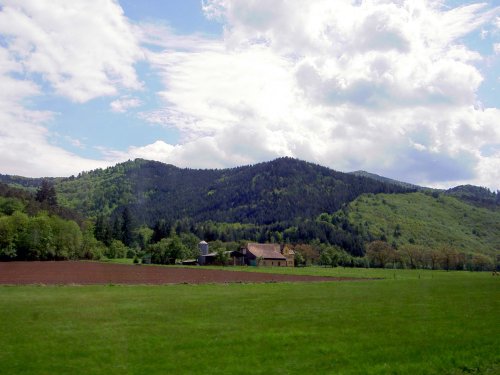
Wandering the French countryside in 1914, German soldier Hans Fleischer made a remarkable discovery:
Through the thick underbrush, I meandered my way through a small path. Wonderful woods all around me. Not too long thereafter, I came upon a lighted area, and before me lay in the middle of a blooming flower garden, in peaceful silence, the castle of Baron de Turckheim. I stood struck in sight of it, and slowly I went closer to the gentle hills. Behind me lay Blamont. A wonderful picture, this little city with its red-brown roofs, built into a rolling valley, and marked by the old weathered ruins that Bernhard once destroyed during the Thirty Year’s War, and the high, double towered gothic church. Like an old, good Swabian town, there it lay, an image of freedom in the middle of the destruction of war. I went further through the garden and fields, past Weihern, and soon I stood on the terrace of the glorious construction. With astonishment, I climbed the stair and went in.
What a miserable image of destruction! The whole glory and wonder of this castle had become ruins and piles of rubble, everything cut down and in pieces, the wonderful chamber with its glorious library and its heavy, gold shrine, the woodwork covered room with its proud row of ancestor’s portraits, the lovely living room with its uncommon furniture — everything forever demolished. With a shudder, I went through the rooms. There! In one corner in the back — was that not a grand piano? I stood in my tracks, and then almost fell down with shock. Right! A grand piano: Steinway & Sons and untouched. A miracle! Finally, finally, music! How painful and with what longing I had missed just this holiest of all arts, and now I find in the middle of all of this rubble a grand piano! The room became like a temple to me, and I sat down as if at an altar. I began slowly, my fingers gliding tremblingly over keys no different than others I have played on. All of my longings became swelling tones that went out into the summer morning. They were holy moments of the blissful memories of the world, whenI was able to make music again for the first time. I awoke like out of a dream when I stopped.
But there! What was lying right under the piano? Did I see correctly? Right, sheet music! In haste I grabbed for the ‘The Valkyries.’ That was the culmination of my happiness, to find my Valyries here! Soon, the sound rang out. Joyously and then more so. The old, raw soldier’s playing became more relaxed, and seldom has a song of love and springtime and inner power emanated from me with more emotion. Outside, the destructive struggle between life and death, with all of its terrible incidents and gruesomeness — and here, in this moment, a German song of love. Rare, unforgettable hours! Feeling deeply fulfilled and happy, I had been taken back to my peaceful garden house. I was at home. I had made German music, and now I could go into war again. Blessed, I returned to my comrades.
From Andrew Carroll’s book Behind the Lines. Fleischer is believed to have been one of 95,000 Jews fighting for the German Army. If he survived, he would have been the victim of constant persecution in the Nazi regime, even having fought for Germany. What became of him is unknown.
